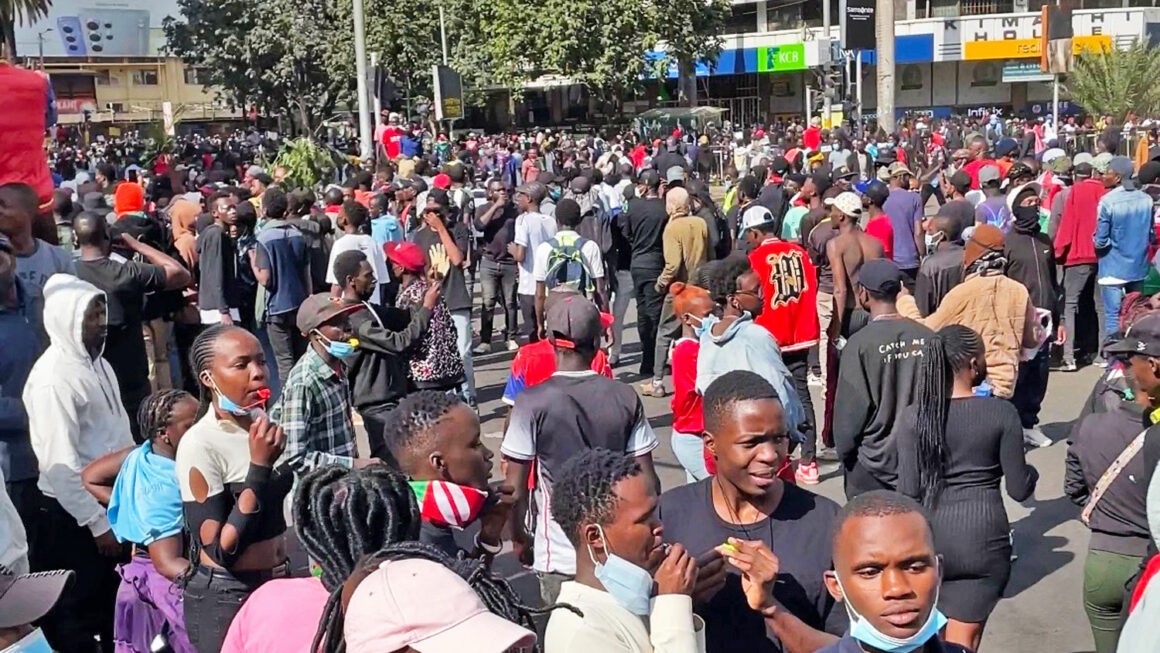“Kenyans are not angry enough.”
Origin unknown.
Meaning: Despite this new, terrible thing that the government has done, Kenyans will not rise up to fight it.
This phrase shows up often on social media. First as a frustrated refrain and then later as a bitter accusation. It really means, there’s nothing we can do, what difference will it make or I thought we were better than this.
After years of runaway corruption, impunity and the catastrophic failure of institutions, Kenyans seem to have leaped over anger and gone straight to righteous fury.
The real trouble started in May when the Finance Bill 2024 was presented to parliament. The bill contained President William Ruto’s administration plan on how to raise revenue for the coming year’s eyebrow-raising budget. Expectations were low but even Kenyans, who make it a cultural priority not to freak out, were flabbergasted. The hits kept coming; a new motor vehicle tax after last year’s new taxes on petrol and imported goods, a tax on sanitary towels, condoms and diapers, further expansion to the categories of goods and services subject to VAT and so much more. From the former president, a nepo baby if there ever was one, it would’ve been unacceptable. From William Ruto, the hustler and wheelbarrow president, it was crossing a red line.
And why does President William Ruto’s administration have to dig even deeper into Kenyans pockets to raise money?
A cursory look at local newspapers going back just a handful of weeks shows that the money cannot be for much needed infrastructure for education, healthcare, ICT services or public transport. It is not for interventions to help with economic recovery or to boost youth employment. It is not for the thousands of farms, businesses and homes that were destroyed by floods in April and May. It is not to address the alarming rise in teen pregnancy, sexual assault and femicide. It is certainly not to support immigrants to the Middle East who may be victims of human trafficking and exploitation.
In comes the IMF
Mostly, it’s for the IMF. At some point in the last fifteen years or so, senior government officials discovered that as long as they had a social security fund to borrow against, they could leave alone all that governing nonsense and just shop for loans. By thieving diligently from the moment they were sworn in, they would then have enough in their war chests to steal elections, undermine the rule of law and destroy all opponents.
It’s hard to say precisely what drove young Kenyans into the street but like all popular youth political movements of the last decade, the underlying motivator is a deep sense of betrayal and an urgent need for revolutionary change. One must situate Kenyan youths’ plights in the larger, global context. The punishing tax regime in Kenya is a direct result of interventions by Western controlled banks & financial institutions like the World Bank and the IMF. Neocolonialism looms large in the issues at play. Kenya is an uncompromising ally of the United States. President Ruto’s government sides with US policy on Palestine, he’s defied the High Court of Kenya and sent 400 police officers to Haiti in support of American imperialistic operations there and Kenyan troops are in the DRC doing who the f**k knows.
To further this pro-west position, Ruto has happily taken after his predecessor Uhuru Kenyatta in near constant international travel. The president just loooves a little trip. President Ruto has spent the first year of his term on a global tour in which he has championed eco-capitalist schemes like carbon credits which incentivise companies to obtain vast tracts of land in the guise of climate action while indigenous peoples are dispossessed and subject to state violence. He has also repeatedly made claims about solving Kenya’s unemployment and underemployment crisis through agreements to ship youth to work abroad. On the face of it (and in the carefully worded speeches given on international stages) these moves show commitment to fighting climate change and youth unemployment. But suggesting this will get you laughed at anywhere in the country.

This clash of what things appear to be and what they actually are is ultimately why young Kenyans decided to Occupy Parliament. The obvious malice in the drafting of the budget and the Finance Bill 2024 was met with anger online. When asked to explain themselves on TV, both civil appointees and MPs failed to justify the new tax proposals. No attempts were made to address the public outcry until protests were announced and then, if you can believe it, MPs from the ruling party retreated to a luxury hotel to strategize. At every level, concerned citizens were met with frustration and derision. The message from the government was clear, “Shut up and suffer.”
On June 18, #RejectFinanceBill2024 went viral. A horizontally organised, grassroots movement was the last thing they expected. It’s exactly what they’re getting.
Kenyans are good at fast, digital mobilisation. With essentially zero social safety nets, a decentralised system has risen in the form of sacco’s (micro investment groups), fundraising groups and digital information gathering/spreading. All are ways in which Kenyans have endured the high costs of poor social services and bureaucratic neglect from every branch of government. It’s that good ol’ Harambee spirit. The Occupy Parliament protests leveraged this ability to mobilise quickly to execute protests and protect each other from retribution mainly in the form of police brutality. Add to that young Kenyans’ significant presence on TikTok and fast internet because of this one (1) man named Amb. Bitange Ndemo, things were boiling nicely as many a tweep noted.
They say again, “Shut up and suffer.”
Of course, Kenya police responded with unprovoked violence including abductions, threats and murder. When the June 25th protests broke out throughout the country, police shot live bullets at protestors killing and injuring dozens. Later the same night and well into the early hours of Wednesday, June 26, police lay siege to Githurai, an impoverished town bordering Nairobi, a shocking call back to the brutal days of Michuki’s death squads. Waking up to reports of these bloody attacks has shifted the mocking tone Kenyans on X had taken against the president. He is no longer trolled as Zacheus the tax collector but as a tyrant, finally shaking off a facade. Perhaps Kenyans are reminded of similar brutalities in 2007 that amounted to war crimes and for which William Ruto stood accused at the Hague.
All this while the rest of the world marches forward, making great strides in science and development. And making money. While intern doctors help to hold up collapsing health systems, their peers recover from the global pandemic and have a front seat to a seeming golden age of medical discovery. While Afrobeat and amapiano artists take over popular music everywhere, Kenyan artists, producers and even promoters are thwarted at every turn. While the tech industry raises the ceiling for income to historical heights, Africa’s silicon savannah withers away under draconian laws and zero investment.
When Kenyans say that the ruling government wants to see them dead, they have good reason to.
When they say they will not stop nor shall they be cowered, they mean it.
When they say ‘you cannot kill us all’, they hope it’s true.
Wakilisha Staff
Our mission is simple: to uplift and safeguard African culture, with all its diversity, for generations to come. We celebrate our heritage and ensure its enduring legacy through in-depth coverage of the happenings across the continent, engaging initiatives, and collaboration with other African cultural practitioners.
1 Comment
Comments are closed.





Next we’re going after the MPs who voted for that finance bill. ✊